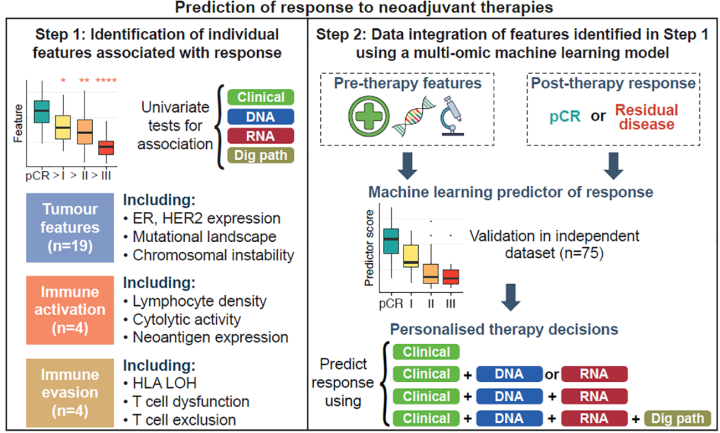Multi-omic machine learning predictor of breast cancer therapy response
Edinburgh clinicians contributed to a study that developed new AI-based predictor of response to cancer therapy: December 2021
Matching the best possible anticancer treatments to disease characteristics of individual patients is the main objective of cancer clinicians and the ultimate goal in the field of personalised medicine. It is now clear that response to therapeutics depends not only on properties of cancer cells, but is also influenced by normal cells, molecules, and tissues (including blood vessels and immune system cells) that surround and feed a tumour, so called tumour mircoenvironment.
Over the years scientists developed sophisticated methods to study properties of cancer cells and tumour microenvironment, including so called multi-omics approaches capable of analysing multiple features, such as cellular genomes or levels of expression and sequences of RNA molecules produced in different cells, at the same time.
Combined with pathology information and other features that can be investigated before and after treatments, these kind of data could provide unprecedented insights into the disease and help predict outcomes of different treatments in more detail and with better accuracy than even most experienced clinicians. Unfortunately, this is not a common situation yet. There are two major reasons for this: the first is that it is still not easy to collect and analyse all relevant data from before and after treatment for patients with different tumour types, the second is related to a lack of good predictive models that would enable rapid translation of convoluted molecular and pathological information into a form that could be easily interpreted and utilised by clinicians.
A recent study titled “Multi-omic machine learning predictor of breast cancer therapy response” and published in the journal Nature goes some way towards addressing these issues for breast cancer patients. Investigators from Cambridge, Melbourne (Australia), Coventry, Livingston, Toronto (Canada) and Edinburgh, including Dr Jeremy Thomas, Dr Larry Hayward, Prof David Cameron and Prof John Bartlett from Edinburgh Cancer Research Centre, teamed up to collect clinical, digital pathology, genomic and transcriptomic profiles of pre-treatment biopsies from 168 patients treated with chemotherapy +/- HER2-targeted therapy prior to surgery. This information was subsequently linked to therapy outcomes (complete response or residual disease) at the time of surgery and used to develop machine learning model (machine learning is one of Artificial Intelligence approaches) which was able to predict complete response with very good accuracy in unrelated cohort of 75 patients.
The study, led by Prof. Carlos Caldas from University of Cambridge, showed that machine learning models for therapy response prediction that combine clinical, molecular and digital pathology data significantly outperform those based on clinical variables. The developed machine learning approach should be also applicable to other cancers and could be customized to include both fewer and newer features.
This study exemplifies benefits of close collaboration between the University and NHS and their respective cancer centres. It is only with the support, collaboration and in some cases leadership of the NHS research infrastructure and research motivated NHS clinicians that academic clinical translational work can thrive. The study published in Nature could lead to direct improvements for cancer patients. In a clinical workflow the predictive models could be applied to candidates for neoadjuvant therapy. Any patients predicted to have chemoresistant tumours should be considered for enrolment into clinical trials of novel therapies, as their prognosis is poor if they are treated with standard of care therapies.

Related Links
Article in Nature: https://www.nature.com/articles/s41586-021-04278-5
Machine Learning explained: https://mitsloan.mit.edu/ideas-made-to-matter/machine-learning-explained
Information about breast cancer: https://www.cancerresearchuk.org/about-cancer/breast-cancer
Related Stories
- Partnership with DATA-CAN to collaborate on cancer research using health data
- Clinical trial identifies effective adjuvant therapy for patients with kidney cancer
- The impact of the Covid-19 pandemic on breast cancer early detection and screening
- Opportunities for stratification in endometrioid ovarian carcinoma
- Optimizing treatment for the older and frailer cancer patients
- AI - empowered personalized cancer medicine

